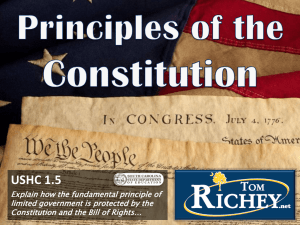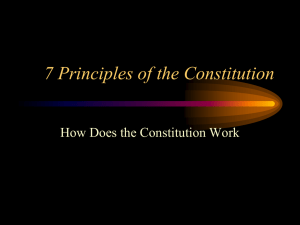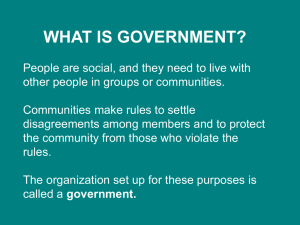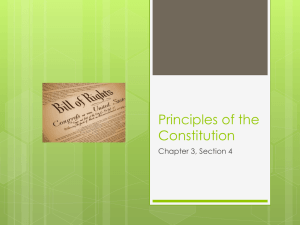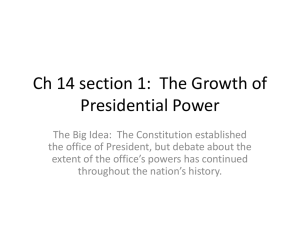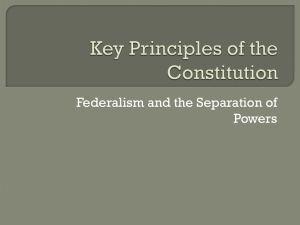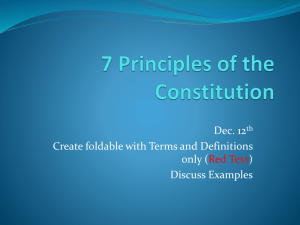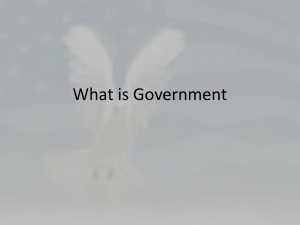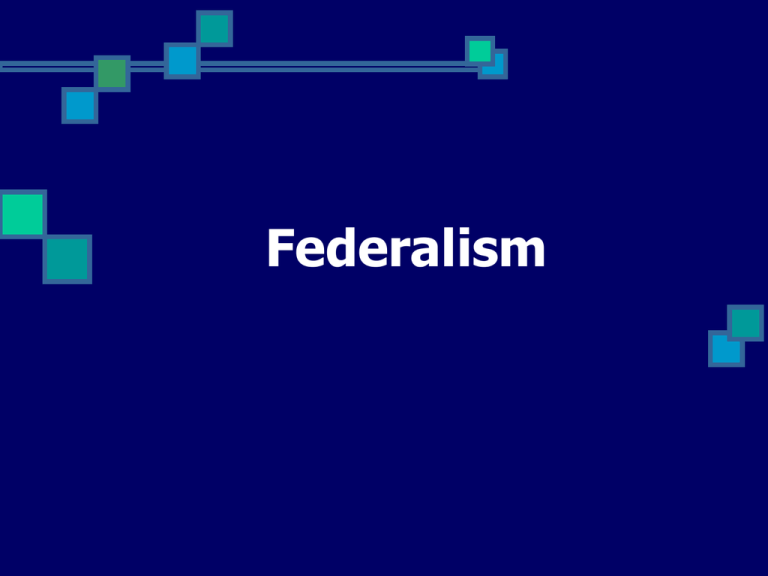
Federalism
Constitution & Federalism
Core Questions
What should be the relationship between the national
& state governments?
How should powers be allocated between them?
Why did the Framers choose a federal
system?
13 original states combined were larger than
England or France
Regional isolation because of poor transportation,
communication & geographic spread
Long time for national government decisions to reach
many of the states
Confederate system was a failure
National government too weak
National government unable to handle crises
Low international standing
Constitution & Federalism
Why did the Framers choose a federal
system?
Advantages of a federal system
Good for delegating many government functions to
local governments
Local government being the focus of political
satisfaction when things go wrong, e.g.
Impractical for political authority to be in one
place in a big country
People have better and more direct access to
and influence on local and central governments
National government won’t be remote, faceless,
and all-powerful (to the voters)
Systems of Government
System of government in the world
About 200 independent nations in the world
Each having its own system of government
Three systems in existence for ordering relations
between national & local governments
System 1: A Unitary System
Ultimate authority in the hands of the national
government
National government can overrule local government
decisions
National government can cu off funding of local
governments
Important policy issues such as education, police,
use of land, and welfare are made by national
government
Systems of Government
System of government in the world
System 1: A Unitary System
Local leaders can be appointed by the national
government
National government derives its power directly from
the voters
Local governments derive their power from the
national government.
System 2: a confederal system
A system of government composed of a league of
independent sub-national units with essential
sovereign power
Authority derived from sub-national units
Sub-national governments derive power from
voters directly
Systems of Government
System of government in the world
System 1: A Unitary System
System 2: a Confederal System
The national government is not directly responsible
to the voters.
System 3: a Federal System
Authority is divided between national & subnational governments
Both national and local governments act directly on
the people (derive power from people directly)
The Federal System
Proven Advantages of the Federal System
State governments have long been a training
ground for future national leaders
Ronald Reagan
Jimmy Carter
Bill Clinton
George W. Bush
States can be the testing sites for new
government initiatives
Wisconsin’s unemployment compensation
California’s air-pollution control policy
Vermont’s same sex marriage legislation
Constitutional Basis of Federalism
Constitution
No mention of the designation of “federal
system”
No systematic division of governmental
authority
It sets out 3 types of powers
Powers of the national government
Powers of the states
Prohibited powers
It establishes the “supremacy clause” to
resolve conflicts between national and state
laws
Define “supremacy clause”
Constitutional Basis of Federalism
National Government Powers
Expressed powers
Powers specifically granted to the national
government
e.g., set standards for weighs and measures
e.g., make uniform naturalization laws
e.g., establish post offices
e.g., declare war
e.g., negotiate and approve international treaties
e.g., regulate inter-state trade.
Inherent powers
Powers derived from an express power or the
“necessary and proper clause”
Constitutional Basis of Federalism
National Government Powers
Expressed powers
Inherent powers
Powers derived from an express power or the
“necessary and proper clause”
e.g., national government to represent the US
overseas
e.g., executive power to recognize a foreign
government
State Government Powers
10th Amendment:
Powers not delegated to the national government by
the Constitution & not prohibited y it, e.g.,
Authority over intra-state trade
Constitutional Basis of Federalism
State Government Powers
10th Amendment:
Powers not delegated to the national government by
the Constitution & not prohibited y it, e.g.,
Make laws on all matters not prohibited to states
Have police power
Authority to legislate for the protection of the health,
morals, safety, and welfare of the people
Make laws governing crimes, marriage, contracts,
education, traffic laws and land use.
Prohibited Powers
10th Amendment: any power not delegated expressly
or implicitly to the federal government by
Constitution is prohibited to it.
Constitutional Basis of Federalism
Prohibited Powers
10th Amendment: any power not delegated expressly
or implicitly to the federal government by
Constitution is prohibited to it, e.g.,
National government cannot create a national
public school system
States are expressly denied the powers
delegated to the national government, e.g.,
signing treaties with foreign countries.
Other Powers
Concurrent Powers
Power to tax
Power to borrow money
Power to establish courts
Constitutional Basis of Federalism
Other Powers
Concurrent Powers
Power to spend money for general welfare
Power to take private property for public purposes
with just compensation
Federal Guarantees to the States
A representative form of government
Equal suffrage in the US Senate
Protection against foreign invasion & domestic
violence
1957, federal troops to Little Rock, to enforce SC
ruling and to “prevent domestic violence”
Federal v. State Governments
Federal Guarantees to the States
Preservation of states’ territorial integrity
Provision for admitting new states.
Inter-state Guarantees
“full faith and credit”
given in each state to the public acts, records
& judicial proceedings of every other state,
e.g.,
Civil judgments of other states
Private contracts made under the law of other
states
Federal v. State Governments
Inter-state Guarantees
“full faith and credit”
Question 1: Should Texas recognize another state’s
law legalizing same sex marriage?
Question 2: Is Congress’s 1996 Defense of Marriage
Act allowing states not to recognize same sex
marriage contradictory to Constitution?
“Privileges & Immunities”
The citizens of each state shall be entitled to all privileges
and immunities of citizens in the several states.
No discrimination against citizens from other states
No favoring of own citizens in matters such as
Acquisition of property
Starting businesses
Access to a state’s courts
Federal v. State Governments
Inter-state Guarantees
“Privileges & Immunities”
Some exceptions:
Out-of-state tuition
Interstate rendition or extradiction
“A person charged in any state with treason,
felony, or other crime, who shall flee from
justice & be found in another state, shall, on
demand of the executive authority from the
state from which he fled, be delivered up, to
be removed to the state having jurisdiction of
the crime.”
Defining the Constitutional Powers
Some Facts about Division of Power
Constitution must have some degree of
ambiguity in language to endure and be
effective
Such ambiguity exists on division of powers
between state and national governments
Ambiguity leaves door open for different
interpretation
Disputes over the boundaries of nat’l v state
powers hae characterized the US politics from
the beginning
The Supreme Court has the final say to
resolve the differences in views.
Defining the Constitutional Powers
Expansion of National Powers
The case of McCulloch v. Maryland (1819)
Background:
U.S. Constitution says nothing about
establishing a national bank
Congress chartered 2 banks
The 1st and 2nd Banks of the U.S.
The two banks provided part of the Congress’ initial
capital
They were therefore the national banks.
Tax imposed on the 2nd Bank’s branch in
Baltimore by Maryland
Bank’s cashier James McCulloch refused to
pay
Maryland sued and won case against
McCulloch in Maryland court
Defining the Constitutional Powers
Expansion of National Powers
The case of McCulloch v. Maryland
(1819)
Background:
Federal government appealed the case to
the US Supreme Court
Two issues for the Court
Did the nat’l government have the
implied power under the necessary &
proper clause to charter a bank and
contribute capital to it?
If the bank was constitutional, could a
state tax it?
Defining the Constitutional Powers
Expansion of National Powers
The case of McCulloch v. Maryland
(1819)
Background:
Two issues for the Court
Supreme Court ruling
If such a national bank aided the national
government in exercising designated powers, then
the authority to set up such a bank could be implied.
No state could use its taxing power to tax an arm of
the national government. If it could, the
“supremacy clause” would be an empty statement.
--------Chief Justice John Marshall
Significance
Defining the Constitutional Powers
Expansion of National Powers
The case of McCulloch v. Maryland
(1819)
Background:
Two issues for the Court
Supreme Court ruling
Significance
Marshall’s decision enabled the national
government to grow and to meet problems that
the Constitution’s framers were unable to
foresee.
Defining the Constitutional Powers
Expansion of National Powers
The case of Gibbons v. Ogden (1824)
Background
N.Y. state legislature granted to Robert Fulton
exclusive right to operate steamboats on the
Hudson River.
At the same time, Congress licensed a ship to sail on
the same waters.
Both N.Y. and New Jersey wanted to control
shipping on the lower Hudson River.
Commerce clause in the Constitution giving power
to Congress to regulate international, inter-state,
and Indian trade
The meaning of the clause is in dispute
Defining the Constitutional Powers
Expansion of National Powers
The case of Gibbons v. Ogden (1824)
Background
Issues
How to define the term “commerce?”
What was the scope of Congress’s authority
under the commerce clause?
Whether the national government’s power to
regulate inter-state trade was extended to
commerce within a state (intra-state
commerce)?
Was the power to regulate inter-state
commerce a concurrent power (as the N. Y.
court had concluded) or an exclusive national
power?
Defining the Constitutional Powers
Expansion of National Powers
The case of Gibbons v. Ogden (1824)
Background
Issues
Supreme
Court Ruling
Commerce refers to all commercial intercourseall business dealings – including navigation and
the transport of people
National government could not regulate solely
intra-state commerce
Power to regulate interstate commerce was an
exclusive national power.
Defining the Constitutional Powers
Expansion of National Powers
The case of Gibbons v. Ogden (1824)
Background
Issues
Supreme
Court Ruling
Significance
Justice Marshall’s expansive interpretation of the
commerce clause in Gibbons v. Ogden allowed the
national government to exercise increasing
authority over all areas of economic affairs
throughout the land
Defining the Constitutional Powers
Expansion of National Powers
Southern State Reaction
In 1828, Congress passed a tariff. South Carolina
tried to nullify it, claiming in case of conflict
between a state and the national government, the
state should have the ultimate authority over its
citizens.
Over the next three decades, N and S became
sharply divided over tariffs and the slavery issue.
Dec 20, 1860 S. Carolina repealed its ratification
of the Constitution and withdrew from the Union.
The outbreak of the civil war.
Impact of the Civil War
Defeat of South permanently ended any idea that
a state within the Union can successfully claim the
right to secede, or withdraw, from the Union
Defining the Constitutional Powers
Expansion of National Powers
Southern State Reaction
Impact of the Civil War
Ironically, Civil War –brought about in large part
because of the South’s desire for increased states’
rights – resulted in the opposite: an increase in the
political power of the national government.
Concessions to the States
An era of “dual federalism”
Dual federalism:
a system of government that states and the national
government remain supreme within their own spheres.
the national and state as co-equal sovereign powers
acts of states within their reserved powers are
legitimate
commonly depicted as a layer cake, state and federal
governments are like separate layers in a cake.
Defining the Constitutional Powers
Expansion of National Powers
Southern State Reaction
Impact of the Civil War
Concessions to the States
Dual Federalism in Action
In the decades following the Civil War, the national
government stayed out of purely state affairs
The courts tended to support the states’ rights to
exercise their police power and concurrent powers in
regard to the regulation of intra-state activities.
In 1918, the Supreme Court ruled that a 1916
federal law banning child labor was unconstitutional
because it attempted to regulate a local problem.
Defining the Constitutional Powers
Expansion of National Powers
Cooperative Federalism
Background:
March 4, 1933, FDR became the 32nd American
President
In 1932, nearly 1,500 banks had failed; 4,000
banks went bankrupt in 1933.
Between 1932 and 1933, 32,000 businesses
closed down and America’s unemployment hit
25%.
State governments reacted very slowly and
indecisively to the emerging economic crisis.
The national government had been expected to
do something about the disastrous state of the
nation’s economy.
Defining the Constitutional Powers
Expansion of National Powers
Cooperative Federalism
Background:
The implementation of FDR’s New Deal signified a new
era of intimate cooperation between the federal and
state governments. Thus, the era of cooperative
federalism began.
Defining Cooperative Federalism
states and the national government should
cooperate in solving problems
joint action between the national government and
the states
a marble cake.
Growth of National Government in the
20th Century
Both the executive and legislature hold that the national
government has an obligation to develop economic and social
programs that promote individual security and social goods.
FDR, Truman, JFK, Carter, Clinton stood for expansion of
national government powers;
Ronald Reagan argued for division of power based on
10th Amendment
Widespread disillusion with the states that are often
Indecisive in times of crisis
Timid and ineffective
Not willing to face problems
Not responsive and not interested in cities.
Growth of National Government in the
20th Century
Crises
WWI
The Great Depression
WWII
Growth in population and social complexity
Industrialization,
urbanization,
expansion of inter-state and international trade,
development of national transportation and
communications systems
flow of people across state lines
growth of organized labor and lobby groups
These factors posed problems too complex for individual
states to handle.
Social Welfare Act passed in 1935
Growth of National Government in the
20th Century
A new set of expectation
No government, least of all, a democratic one,
operates in a vacuum. What it does depends in
large part, on what is asked of it. Now almost
everyone looks to Washington for aid and for
solutions to their problems.
Health care
Price supports for agricultural products
Clean air
Wholesome meat
Housing
Curtailment of violence on TV
Growth of National Government in the
20th Century
Expansion of National power through court
decisions
Superior financial resources of national government


